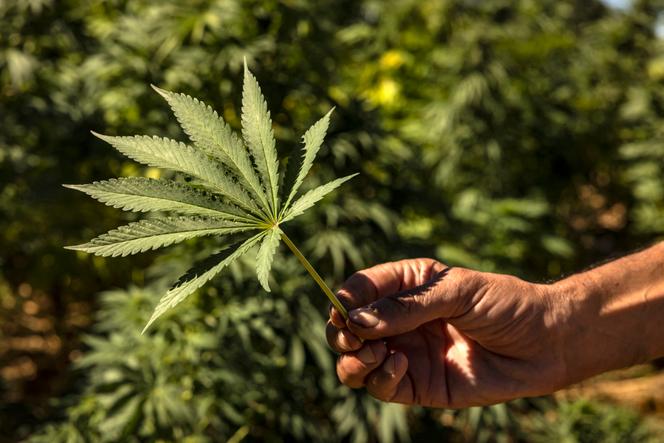
2023 may be the year of his first legal cannabis harvest. After years of semi-underground, Aziz has decided to move over to "the legal side." The farmer from the Rif, a mountainous region in northern Morocco that is home to one of the world's largest cannabis-producing areas, intends to turn his back on drug traffickers and sell his kif to companies involved in the manufacture of cannabis products.
In a hamlet near Talambote, about 20 kilometers from Chefchaouen, Aziz's plots are located at the end of a winding track lined with conifers. The season has started. The 38-year-old farmer has just sown the seeds for the summer harvest. A few months ago, he created his cooperative, as required by the 2021 law passed by Morocco, which allows the cultivation of cannabis for medical and industrial purposes while maintaining the prohibition of its recreational use. He has applied for a license from the Agence Nationale de Réglementation des Activités Relatives au Cannabis (ANRAC). He still needs to find a company willing to buy his crop. "Two Americans came to the village a few days ago," he said. "They want to build a factory in the area and will need large quantities. They are interested in our plants. We haven't talked about price yet."
In the surrounding villages, Aziz is a trailblazer. According to him, "most of the farmers have not done anything." He decided to take the plunge mainly to live without the fear of prosecution, because "there is always the risk that a buyer caught by the police or a malicious neighbor reports you." "But financially," he said, "I don't see what the legal market is going to do for us."
'We have nothing but kif'
In the region, it is difficult to see the effects of the new legislation, which for now seems to have created more doubts than enthusiasm. "What I fear is that the benefits will go to the state, laboratories and multinationals and that we will be left behind," said Farid, in his fifties, who grows kif in a nearby village. For the moment, he says he is "in the dark": "To whom and at what price will we sell? Which seeds? Will they be suitable? We have nothing but kif. We're not going to risk losing everything."
In the country, considered by the UN to cnabe the world's largest producer of cannabis resin, the 2021 law, which aims to "convert illegal crops that destroy the environment into legal, sustainable activities that generate value and jobs," is nevertheless a source of hope. It even appears to be a way out for the Rif, a poor and marginalized region, where this crop is prohibited yet tolerated by the authorities in order to maintain a certain form of social peace. And where the financial windfall generated by the traffic barely benefits the 400,000 people (according to an official estimate) who depend on it.
Only 4% of the revenue from the illegal market goes to the growers, according to the ministry of the interior. "The legal market will guarantee them income four to five times higher than what they earned illegally," said Mohammed El Guerrouj, ANRAC director. "Through their cooperatives, they will negotiate prices. They will have a fixed income, which will provide them with the ability to invest and improve their lifestyle." Not to mention the creation of jobs in the region, he promised, since "the new industries that enter the sector are obliged to invest in the three provinces authorized to grow cannabis," those of Chefchaouen, Al Hoceima and Taounate.
In his office in Rabat, where files to be signed are piling up, El Guerrouj is eager to show that work is progressing: "More than 400 farmers have already obtained a cultivation permit and 75 operators have received processing, marketing or export permits, including pharmaceutical industries, agribusinesses, cooperatives and individuals." On the ground, the four first businesses – one pharmaceutical, the other three cannabidiol (CBD) products – are "in the launching phase," he reported: "A whole dynamic will be put in place for the development of the region and its growers. The added value is for them."
'There will be resistance'
They remain to be convinced. "We are talking about farmers who have mastered the rules of illegality but not those of legality. And who flee from everything that represents the state because of the repression and abandonment of which they have long been victims. There will be resistance," said anthropologist Khalid Mouna, author of the book Le Bled du Kif ("Kif Country," Ibis Press, 2010).
Another uncertainty is what this new legal cannabis market will do. "Will it be geared solely toward medical use? Or will it cover a wider range of products, from cosmetics to food and building materials?" asked sociologist Kenza Afsahi. "The impact on growers will depend on the size of this emerging market, but also on their ability to integrate into the production chain, including processing." The researcher from the Université de Bordeaux anticipates the coexistence of two markets, "as in all countries that have legalized cannabis and never eradicated the illegal market."
"It is obvious that the demand for recreational cannabis is not going to disappear," said Khalid Tinasti, a teacher-researcher in Geneva and a specialist in drug policy. "The illicit market will remain very strong and only a handful of growers will enter the legal market. I don't see how it could be otherwise, except to allow the recreational use of cannabis, which would enable the project to be truly inclusive." An option that is not on the agenda in Morocco, however.